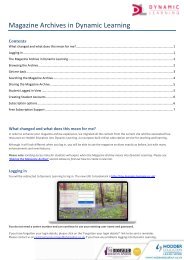POWER
OCR-A-Power-sample-chapter
OCR-A-Power-sample-chapter
You also want an ePaper? Increase the reach of your titles
YUMPU automatically turns print PDFs into web optimized ePapers that Google loves.
Features of this book<br />
Focus<br />
Key questions<br />
Factfile<br />
Focus task<br />
In every topic there is<br />
a Focus box. This sets<br />
out the main events<br />
and developments that<br />
will be covered. It also<br />
highlights the issues<br />
and questions that we<br />
will help you to think<br />
about and develop your<br />
views on.<br />
The big picture<br />
At the start of each topic in Part 1, we summarise the<br />
big picture – in fact, since the whole thematic study is a<br />
big picture we probably should have called it ‘the really<br />
big picture’! This feature sums up the big questions that<br />
historians ask about this period and their thinking about<br />
those questions. We hope it will help you keep an overview<br />
of the period in your head and that it will be a useful<br />
revision tool.<br />
Assessment focus<br />
These are the questions<br />
that take a really big<br />
view of a topic. They<br />
will be similar to the big<br />
questions at the end of<br />
your exam. However, the<br />
Key Questions here are<br />
usually a bit broader than<br />
the questions you are<br />
likely to get in an exam.<br />
This section takes you through the types of questions in<br />
the exam paper, how they are assessed and possible ways<br />
to answer them.<br />
Factfiles are more<br />
or less what they<br />
say – files full of<br />
facts! These give<br />
you important<br />
background<br />
information to<br />
a story, without<br />
interrupting the<br />
narrative too much.<br />
Practice questions<br />
Focus Tasks are the main tasks for<br />
really making sure you understand<br />
what you are studying. They<br />
will never ask you to just write<br />
something out, take notes or show<br />
basic comprehension. These tasks<br />
challenge you to show that you know<br />
relevant historical information and<br />
can use that information to develop<br />
an argument.<br />
These questions come at the end of major sections. They<br />
are designed to help you think about the kinds of questions<br />
you may come across in your exam. We do not know the<br />
exact questions you will be asked, but we know the style<br />
of question. Usually we have shown you the marks that<br />
might be available to give you a sense of how much time to<br />
spend on it. These are explained in the Assessment Focus<br />
sections.<br />
Profile<br />
Profiles are essentially factfiles about people,<br />
summarising the key facts about a historical figure.<br />
Margin questions<br />
These useful little questions are designed to keep you on<br />
track. They usually focus in on a source or a section of<br />
text to make sure you have fully understood the important<br />
points in there.<br />
Activity<br />
Activities are designed to help you think through a<br />
particular question or issue. The thinking you do in these<br />
tasks is usually a building block towards your answer to a<br />
Focus Task.<br />
Uncorrected proof<br />
Part 1<br />
British thematic study:<br />
Power: monarchy and<br />
democracy in Britain<br />
c1000–2014<br />
6




